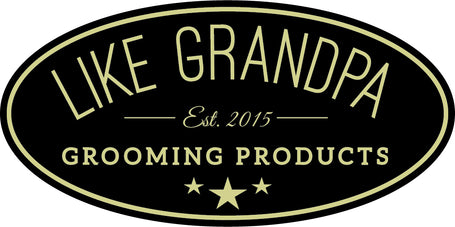product creation
Why we don't use Coconut Oil in our Beard Products
Posted by Keenyn Bijou on
Made in Canada
Posted by Like Grandpa on
How we formulate our products
Posted by Like Grandpa on
How we formulate our products
With today's post, you are in for a treat here at Like Grandpa. We don’t often go into detail on the process of how we formulate our products, but we figured we would give you a peak behind the curtain. Let us know if you find this kind of post interesting!
While we could go into extreme detail on each step, it would create a very long post. Just know that we spend a lot of time intentionally developing every product into exactly what we want it to be.
The steps below are what each product goes through before we launch. This will often take 3-12 months to tweak and refine, sometimes longer, if we have setbacks in the beginning.

- Blank page - What characteristics do we want the final product to have? If we could describe our perfect product what would it be?
- Our ‘NO’ list - We don’t want our product to do these things or they should be different in these area. *sometimes this NO list is what leads us to developing a specific product in the first place.
- First principles - The list of ingredients that can contribute to a final formula. A combination of science and experience. Specific ingredients handle in predictable ways, so which long list of ingredients can be predict might fit within this product.
- High level prototyping - Trying out some preliminary formulas to see if things are viable. This is where our most epic failures come from. We always learn the most in this stage.
- Prototyping different variations - We take a few drastically different bases and see how we like them. While reaching out to our testing network to see what their thoughts are.
- Sensitivity Analysis - Once a base is selected as something we like, we vary each and every ingredient across an entire range. This is to see how each corresponding characteristic changes in performance and where the “sweet spot is”. This means a ridiculous amount of tests. A formula might have 4-8 ingredients, and we could vary each ingredient over 3-8 concentrations. If you do the math, it equal LOTS!! (our latest Aftershave Splash had 28 variations in this stage)
- Second round testing - We pick out a handful of front runners with unique characteristics (reference blank page section) and give them to our testing network to review.
- Revisions - This is where we take the feedback of our testers and tweak the formula to get the best result we can.
- Scent selection and variation - Single note scents vary drastically based on processing method and point of origin. Selecting the perfect single note is harder than one might think. As you may have noticed, we don't like to do any blends. For us, we strongly believe that simplicity of scents helps create a soothing experience when using our products.
- Final product testing. - This is testing with our broader test group for final approval.
- Delivery to market - Which is the most exciting stage, as you can imagine!
Thats a lot of steps eh? Usually we have 2-4 products in various stages of development at any time. Half of the products we create don’t make it to market. This is because we feel they don’t perform as well as we want, or we would have to use ingredients we don’t like to get the performance we desire. Sometimes, a product is developed, and then shelved because the formula makes it difficult to manufacture. That happens too.
You might think that as a small manufacturer we just toss some coconut oil and whatever we have in the pantry into a bottle, slap a label on and sell it. This couldn’t be further from the truth. Next time you pick up your Like Grandpa (or Like Grandma) product, think about how each and every decision that was made just for you.
